The Inspiring Story of Silent Night
He was illegitimate, grew up in a hangman's cottage, and he wrote the words for 'Silent Night'. His mother's name was Anna Schoiberin. His father was a mercenary soldier and deserter called Franz Mohr, who never saw him. The hangman provided accommodation in his house for single mothers and their children, as he was trying to improve his reputation by works of charity. So it came about that Joseph Mohr, the illegitimate boy, was baptised in Salzburg cathedral with the hangman as his godfather.
Joseph was talented. The local priests provided for his education, and he learned to play the organ, violin and guitar. After seminary studies, he was ordained a priest at the age of twenty-three. His first appointment was to the village of Mariapfarr, Austria, in 1816.
The young Fr Joseph Mohr was utterly devoted to his people. He did not hesitate to slog through deep snow to minister to them. He contracted tuberculosis, which would trouble him for the rest of his life.
German history books call 1816 "the dark year", "the year without a summer". The sun was masked by volcanic smoke from the 1815 eruption of Mount Tambora on the Indonesian island of Sumbawa. Crops failed, and hunger was rife.
It was a ghastly year for Austria and Europe in general. Devastated and brutalised by the twelve years of the Napoleonic wars, people longed for peace.
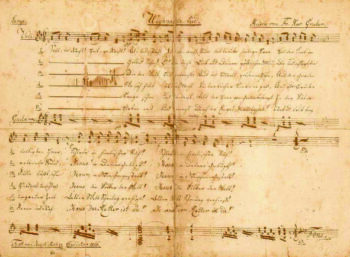
Original copy of Silent Night, written out by Fr Joseph Mohr. His signature and the year 1816 is in the bottom left corner. The document came to light in 1995.
In the church in Mariapfarr, there was a painting of the Nativity of Jesus which Joseph would have seen every day. Possibly this painting inspired the words for his poem, which "encapsulated his love of God and his people's longing for peace in troubled times". The people of Mohr's parish were impoverished, starving and distressed. The six-verse poem expressed the hope that God still cared for them. The German text declares that today all the power of fatherly love is poured out, and Jesus as brother embraces the peoples of the world.
A literal translation of the first two verses is somewhat different from the version we know in English:
Silent night, holy night
Everything is asleep
Only the faithful, holy couple are awake,
Lovely boy with curly hair
Sleep in heavenly peace
Sleep in heavenly peace
Silent night, holy night
God's Son laughs, oh how bright
Love from your holy lips shines clear
As the dawn of salvation draws near
Jesus, Lord, with your birth
Jesus, Lord, with your birth
In 1817, Joseph transferred to Oberndorf, just south of Salzburg, where the bishop thought that the climate would be better for his health. The town had become Austrian in 1815 when European borders were re-drawn in post-Napoleonic times at the Congress of Vienna. It was a time of economic misery, with one poor harvest after another bringing widespread famine.
Franz Xaver Gruber was a teacher in Oberndorf, as well as being the sacristan, organist and choirmaster at the Church of St Nicholas.
Franz was the fifth child of impoverished linen workers in the town of Uterweizburg, Austria.
He worked for the family from his earliest years "manipulating a row of bobbins while other children of his age played on the green outside".
At the same time, unbeknown to his father, the village schoolmaster, a musician, was teaching Franz the theory of music and how to play the organ. According to one source, "by the time he was twelve years old, he played Bach almost better than his teacher".
One Sunday morning 'a distressed priest' arrived at the Gruber house asking for Franz to play the organ in church. The regular organist was very ill, and the schoolmaster was away on holiday. Franz's father was unhappy with his deceit. However, as he sat in church, he was proud of his son's achievements, and his "joyful tears were mingled with his grateful prayers".
Released from the family's weaving business, Franz continued studying music and became a school teacher. He married at twenty-eight years of age and began living in Oberndorf, where he and Joseph Mohr became friends. Joseph asked him to write a melody for the words of the poem he had written in 1816. It was written in a single day, Christmas Eve in 1818, and performed for the first time after midnight Mass. The damaged organ in the church was unusable, so Joseph played the guitar, 'the people's instrument', as they sang together:
Silent night, holy night.
Brought the world peace tonight
From heaven's golden height
Shows the grace of his holy might
Jesus, as man on this earth
Jesus, as man on this earth.
The carol is sung today everywhere in the world, translated into at least three hundred languages, and still immensely popular. Between 1978 and 2014, the US Copyright Office registered 733 recordings by different singers. It was declared "as a treasured item of Intangible Cultural Heritage" by UNESCO in 2011.
The English version with which we are familiar was somewhat loosely translated from three of Joseph Mohr's verses by an Episcopalian priest, Fr John Freeman Young, in 1859. Young was ministering at Trinity Church, New York. He later became the second bishop of Florida.
The power of this simple carol was illustrated on Christmas Eve in World War I. Private Albert Moren, of the 2nd Queens Regiment, reported that near the French village of La Chapelle-d'Armentières, he heard German soldiers singing 'Silent Night'.
Rifleman Graham Williams, of the 5th London Rifle Brigade, described the atmosphere: "Then suddenly lights began to appear along the German parapet, which were evidently make-shift Christmas trees, adorned with lighted candles, which burnt steadily in the still, frosty air. First, the Germans would sing one of their carols, and then we would sing one of ours. The Germans immediately joined in, and I thought, well, this is a most extraordinary thing – two nations both singing the same carol in the middle of a war".
On Christmas Day, there were several reports of Germans and British holding joint services to bury their dead, and exchanging greetings and gifts in No Man's Land.
Even though their carol was known world-wide, its writers' names had disappeared from memory by the mid-nineteenth century. Joseph Mohr had become parish priest of Wagram and died in 1848. He was so poor that there was no money for his burial. No one knew he had written the lyrics of Silent Night and his grave was forgotten.
Franz Gruber died at the age of 76, a successful musician, in 1863. Fr Joseph Mohr's burial place was rediscovered after World War II and was given the honour due to the writer. Every Christmas Eve, a choir sings 'Silent Night' at his grave.
Joseph Mohr and Franz Gruber were "simple men who loved the people whom they served and loved their Lord above all. It's amazing what one simple act of faith can do".
'Silent Night': "simple words of faith in hard times, words that continue to find hope in the God who cares, centuries later". The carol is a beautiful prayer for peace in our troubled, sad and wounded world, articulating our human longing for peace.
May the promise of Christmas peace be realised in our hearts, in our homes, and in our country, as we pray that the peace of Christ will reign in our world.
Sources:
Marist Messenger, December 1961
The First Silent Night, TV documentary 2014, hosted by Simon Callow
Wikipedia
Sarah Eyerly, The Conversation, 19 December 2018
Michael E Ruane, The Washington Post,
24 December 2018
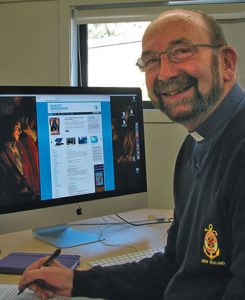
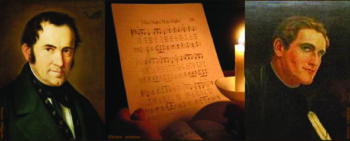
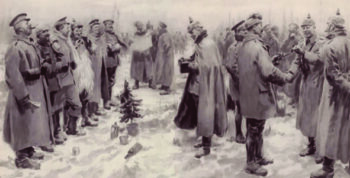
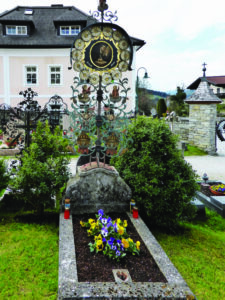
 Entries(RSS)
Entries(RSS)